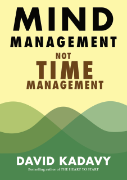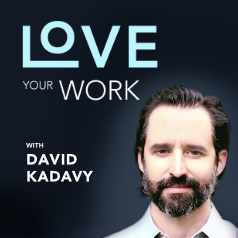Subscribe to blog updates via email »
Hedgehogs and Foxes – Love Your Work, Episode 305
 According to philosopher Isaiah Berlin, people think in one of two different ways: They’re either hedgehogs, or foxes. If you think like a hedgehog, you’ll be more successful as a communicator. If you think like a fox, you’ll be more accurate.
According to philosopher Isaiah Berlin, people think in one of two different ways: They’re either hedgehogs, or foxes. If you think like a hedgehog, you’ll be more successful as a communicator. If you think like a fox, you’ll be more accurate.
Listen to the Podcast

WANT TO WRITE A BOOK?
Download your FREE copy of How to Write a Book »
(for a limited time)
- Listen in iTunes >>
- Download as an MP3 by right-clicking here and choosing “save as.”
- RSS feed for Love Your Work
Isaiah Berlin coined the hedgehog/fox dichotomy (via Archilochus)
In Isaiah Berlin’s 1953 essay, “The Hedgehog and the Fox,” he quotes the ancient Greek poet, Archilochus:
The fox knows many things, but the hedgehog knows one thing.
Berlin describes this as “one of the deepest differences which divide writers and thinkers, and, it may be, human beings in general.”
How are “hedgehogs” and “foxes” different?
According to Berlin, hedgehogs relate everything to a single central vision. Foxes pursue many ends, often unrelated or even contradictory.
If you’re a hedgehog, you explain the world through a focused belief or area of expertise. Maybe you’re a chemist, and you see everything as chemical reactions. Maybe you’re highly religious, and everything is “God’s will.”
If you’re a fox, you explain the world through a variety of lenses. You may try on conflicting beliefs for size, or use your knowledge in a wide variety of fields to understand the world. You explain things as From this perspective, X. But on the other hand, Y. It’s also worth considering Z.
The seminal hedgehog/fox essay is actually about Leo Tolstoy
Even though this dichotomy Berlin presented has spread far and wide, his essay is mostly about Leo Tolstoy, and the tension between his fox-like tendencies and hedgehog-like aspirations. In Tolstoy’s War and Peace, he writes:
In historic events the so-called great men are labels giving names to events, and like labels they have but the smallest connection with the event itself. Every act of theirs, which appears to them an act of their own will, is in an historical sense involuntary and is related to the whole course of history and predestined from eternity.
In War and Peace, Tolstoy presents characters who act as if they have control over the events of history. In Tolstoy’s view, the events that make history are too complex to be controlled. Extending this theory outside historical events, Tolstoy also writes:
When an apple has ripened and falls, why does it fall? Because of its attraction to the earth, because its stalk withers, because it is dried by the sun, because it grows heavier, because the wind shakes it, or because the boy standing below wants to eat it? Nothing is the cause. All this is only the coincidence of conditions in which all vital organic and elemental events occur.
Is Tolstoy a fox, or a hedgehog? He acknowledges the complexity with which various events are linked – which is very fox-like. But he also seems convinced these events are so integrated with one another that nothing can change them. They’re “predetermined” – a “coincidence of conditions.”
A true hedgehog might have a simple explanation, such as that gravity caused the apple to fall. Tolstoy loved concrete facts and causes, such as the pull of gravity, yet still yearned to find some universal law that could be used to predict the future.
According to Berlin:
It is not merely that the fox knows many things. The fox accepts that he can only know many things and that the unity of reality must escape his grasp.
And this was Tolstoy’s downfall. Early in his life, he presented profound insights about the world through novels such as War and Peace and Anna Karenina. That was very fox-like. Later in his life, he struggled to condense his deep knowledge about the world and human behavior into overarching theories about moral and ethical issues. As Berlin once wrote to a friend, Tolstoy was “a fox who terribly believed in hedgehogs and wished to vivisect himself into one.”
Other hedgehogs and foxes in Berlin’s essay
Other thinkers Berlin classifies as foxes include Aristotle, Goethe, and Shakespeare. Other thinkers Berlin classifies as hedgehogs include Dante, Dostoevsky, and Plato.
What does the hedgehog/fox dichotomy have to do with the animals?
What does knowing many things have to do with actual foxes? What does knowing one big thing have to do with actual hedgehogs? A fox is nimble and clever. It can run fast, climb trees, dig holes, swim across rivers, stalk prey, or hide from predators. A hedgehog mostly relies upon its ability to roll into a ball and ward off intruders.
Foxes tell the future, hedgehogs get credit
What are the consequences of being a fox or a hedgehog? According to Phil Tetlock, foxes are better at telling the future, while hedgehogs get more credit for telling the future.
In Tetlock’s 2005 book, Expert Political Judgement, he shared his findings from forecasting tournaments he held in the 1980s and 90s. Experts made 30,000 predictions about political events such as wars, economic growth, and election results. Then Tetlock tracked the performances of those predictions.
What he found led to the U.S. intelligence community holding forecasting tournaments, tracking more than one million forecasts. Tetlock’s own Good Judgement Project won the forecasting tournament, outperforming even intelligence analysts with access to classified data.
Better a fox than an expert
These forecasting tournaments have shown that whether someone can make accurate predictions about the future doesn’t depend upon their field of expertise, their status within the field, their political affiliation, or philosophical beliefs. It doesn’t matter if you’re a political scientist, a journalist, a historian, or have experience implementing policies. As the intelligence community’s forecasting tournaments have shown, it doesn’t even matter if you have access to classified information.
What matters is your style of reasoning: Foxes make more accurate predictions than hedgehogs.
Across the board, experts were barely better than chance at predicting what would or wouldn’t happen. Will a new tax plan spur or slow the economy? Will the Cold War end? Will Iran run a nuclear test? Generally, it didn’t matter if they were an economist, an expert on the Soviet Union, or a political scientist. That didn’t guarantee they’d be better than chance at predicting what would happen. What did matter is whether they thought like a fox.
Foxes are: deductive, open-minded, less-biased
Foxes are skeptical of grand schemes – the sort of “theories of everything” Tolstoy had hoped to construct. They didn’t see predicting events as a top-down, deductive process. They saw it as a bottom-up, inductive process – stitching together diverse and conflicting sources of information.
Foxes were curious and open-minded. They didn’t go with the tribe. A liberal fox would be more open to thinking the Cold War could have gone on longer with a second Carter administration. A conservative fox would be more open to believing the Cold War could have ended just as quickly under Carter as it did under Reagan.
Foxes were less prone to hindsight bias – less likely to remember their inaccurate predictions as accurate. They were less prone to the bias of cognitive conservatism – maintaining their beliefs after making an inaccurate prediction. As one fox said:
Whenever I start to feel certain I am right… a little voice inside tells me to start worrying. —A “fox”
Hedgehogs are: deductive, close-minded, more-biased (yet more successful)
As for inaccurate predictions, one simple test tracked with whether an expert made accurate predictions: a Google search. If an expert was more famous – as evinced by having more results show up on Google when searching their name – they tended to be less accurate.
Think about the talking-head people that get called onto MSNBC or Fox News (pun, albeit inaccurate, not intended) to make quick comments on the economy, wars, and elections – those people. Experts who made more media appearances, and got more gigs consulting with governments and businesses, were actually less accurate at making predictions than their colleagues who were toiling in obscurity. And these experts who were more successful – in terms of media appearances and consulting gigs – also tended to be hedgehogs.
Hedgehogs see making predictions as a top-down deductive process. They’re more likely to make sweeping generalizations. They take the “one big thing” they know – say, being an expert on the Soviet Union – and view everything through that lens. Even if it’s to explain something in other domains.
Hedgehogs are more-biased about the world, and about themselves. They were more likely than foxes to remember inaccurate predictions they had made, as accurate. They were more likely to remember as inaccurate, predictions their opponents made that were accurate. Rather than change their beliefs, when presented with challenging evidence hedgehog’s beliefs got stronger.
Are hedgehogs playing a different game?
It’s tempting to take that and run with it: The close-minded hedgehogs of the world are inaccurate. Success doesn’t track with skill. Tetlock is careful to caution that hedgehogs aren’t always worse than foxes at telling the future. Also, there are good reasons to be overconfident in predictions. As one hedgehog political pundit wrote to Tetlock:
You play a publish-or-perish game run by the rules of social science…. You are under the misapprehension that I play the same game. I don’t. I fight to preserve my reputation in a cutthroat adversarial culture. I woo dumb-ass reporters who want glib sound bites. —“Hedgehog” political pundit
A hedgehog has a lot to gain from making bold predictions and being right, and nobody holds them accountable when they’re wrong. But according to Tetlock, nothing in the data indicates hedgehogs and foxes are equally good forecasters who merely have different tastes for under- and over-prediction. As Tetlock says:
Quantitative and qualitative methods converge on a common conclusion: foxes have better judgement than hedgehogs. —Phil Tetlock, Expert Political Judgement
Hedgehogs may make better leaders
As bad as hedgehogs look now, there are some real benefits to hedgehogs. They’re more-focused. They don’t get as distracted when a situation is ambiguous. So, hedgehogs are more decisive. They’re harder to manipulate in a negotiation, and more willing to make controversial decisions that could make enemies. And that confidence can help them lead others.
Overall, hedgehogs are better at getting their messages heard. Given the mechanics of media today, that means the messages we hear from either side of the political spectrum are those of the hedgehogs. Hedgehog thinking makes better sound bites, satisfies the human desire for clarity and certainty, and is easier for algorithms to categorize and distribute. The medium is the message, and nuance is cut out of the messages by the characteristics of the mediums. Which increases polarization.
But, there is hope for the foxes. While the media landscape is still dominated by hedgehog messages that work as social media clips, there are more channels with more room for intellectually-honest discourse: blogs, podcasts, and books. And if many a ChatGPT conversation is any indication, the algorithms may get more sophisticated and remind us, “it’s important to consider….”
Hedgehogs, be foxes! And foxes, hedgehogs.
If you’re a hedgehog, you’re lucky: What you have to say has a better chance of being heard. But it will have a better chance of being correct if you think like a fox once in a while: consider different angles, and assume you’re wrong.
If you’re a fox, you have your work cut out for you: You may have important – and accurate – things to say, but they have less a chance of being heard. Your message will travel farther if you think like a hedgehog once in a while: assume you’re right, cut out the asides, and say it with confidence.
Image: Fox in the Reeds by Ohara Koson
Join the Patreon for (new) bonus content!
I've been adding lots of new content to Patreon. Join the Patreon »
Subscribe to Love Your Work
Listen to the Podcast
- Listen in iTunes >>
- Download as an MP3 by right-clicking here and choosing “save as.”
- RSS feed for Love Your Work
Theme music: Dorena “At Sea”, from the album About Everything And More. By Arrangement with Deep Elm Records. Listen on Spotify »


